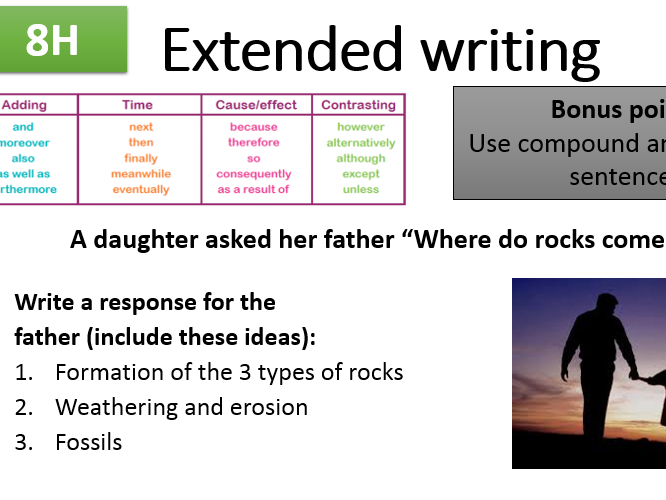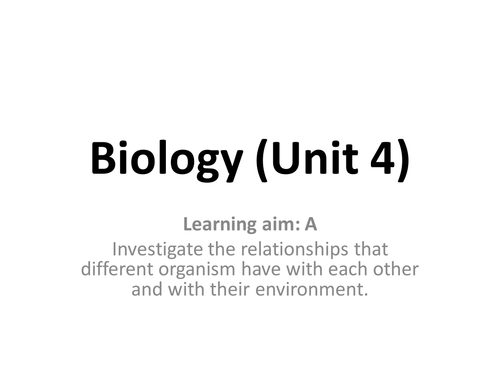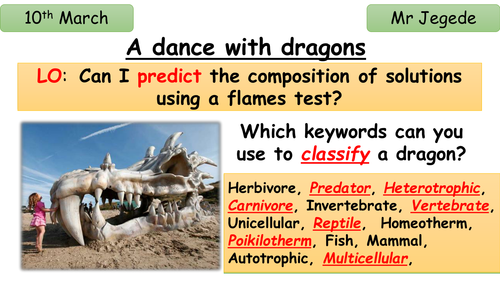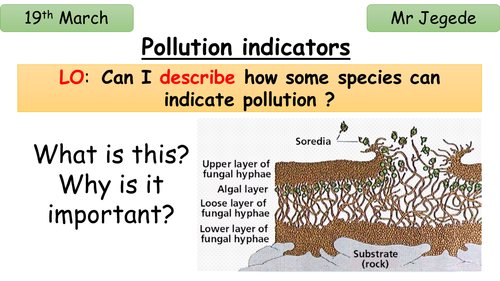243Uploads
125k+Views
57k+Downloads
All resources

C11.2 Condensation polymerisation
AQA GCSE Sciences (9-1)
Chemistry: C11 Polymers
Lesson 2: C11.2 Condensation polymerisation
Based on the Kerboodle Resources
The AQA Kerboodle worksheet are not included so as to be acting within the TES code of conduct.

B18.1 The human population explosion
AQA GCSE Sciences (9-1)
Biology: B18 Biodiversity and ecosystems
Lesson 1: B18.1 The human population explosion
Based on the Kerboodle Resources
The AQA Kerboodle worksheet are not included so as to be acting within the TES code of conduct.
Keywords: Biodiversity

B16.1 The importance of communities
AQA GCSE Sciences (9-1)
Biology: B16 Adaptation and competition
Lesson 1: B16.1 The importance of communities
Based on the Kerboodle Resources
The AQA Kerboodle worksheet are not included so as to be acting within the TES code of conduct.
Keywords: Communities, Interdependence

C4.6 Expressing concentrations
AQA GCSE Sciences (9-1)
Chemistry: C4 Chemical calculation
Lesson 5: C4.6 Expressing concentrations
Based on the Kerboodle Resources
The AQA Kerboodle worksheet are not included so as to be acting within the TES code of conduct.

B14.2 Evolution by natural selection
AQA GCSE Sciences (9-1)
Biology: B14 Variation and evolution
Lesson 2: B14.2 Evolution by natural selection
Based on the Kerboodle Resources
The AQA Kerboodle worksheet are not included so as to be acting within the TES code of conduct.
Keywords: Evolution, Natural selection, Mutation, Variation

B17.2 Materials cycling
AQA GCSE Sciences (9-1)
Biology: B17 Organising an ecosystem
Lesson 2: B17.2 Materials cycling
Based on the Kerboodle Resources
The AQA Kerboodle worksheet are not included so as to be acting within the TES code of conduct.
Keywords: Microbe, Decay

C2.2 Electronic structure and the periodic table
AQA GCSE Sciences (9-1)
Chemistry: C2 The periodic table
Lesson 2: C2.2 Electronic structure and the periodic table
Based on the Kerboodle Resources
The AQA Kerboodle worksheet are not included so as to be acting within the TES code of conduct.
Keywords: Shells, Electronic structure, Noble gases

C2.5 Explaining trends
AQA GCSE Sciences (9-1)
Chemistry: C2 The periodic table
Lesson 5: C2.5 Explaining trends
Based on the Kerboodle Resources
The AQA Kerboodle worksheet are not included so as to be acting within the TES code of conduct.

P4.4 Component characteristics
AQA GCSE Sciences (9-1)
Physics: P4 Electric circuits
Lesson 4: P4.4 Component characteristics
Based on the Kerboodle Resources
The AQA Kerboodle worksheet are not included so as to be acting within the TES code of conduct.

KS3 Science Complete Extended Writing Task (Yr7-8)
Best used just before or after finishing a topic - an ideal activity for deep marking.
Each slide contains a set of connective and also prompt ideas.
Topics included:
* Adaptation, Neutralisation, Particle theory, Detecting sound, Puberty, Drugs and health, Fossil fuels.
* Respiration, Rock cycle, Payback-time, Digestion, Diffusion, Acidification of forests, Pollination, Earth and space
Bundle

B14 Variation and evolution
Save £3 (38%)
Includes:
B14.1 Variation
B14.2 Evolution by natural selection
B14.3 Selective breeding
B14.4 Genetic engineering
Please note: I had to remove the AQA worksheets so as to abide by TES’s code of conduct. Only my worksheets and PPT are included.

C4.3 From masses to balanced equations
AQA GCSE Sciences (9-1)
Chemistry: C4 Chemical calculation
Lesson 3: C4.3 From masses to balanced equations
Based on the Kerboodle Resources
The AQA Kerboodle worksheet are not included so as to be acting within the TES code of conduct.

C11.1 Addition polymerisation
AQA GCSE Sciences (9-1)
Chemistry: C11 Polymers
Lesson 1: C11.1 Addition polymerisation
Based on the Kerboodle Resources
The AQA Kerboodle worksheet are not included so as to be acting within the TES code of conduct.

C13.1 History of our atmosphere
AQA GCSE Sciences (9-1)
Chemistry: C13 The Earth’s atmosphere
Lesson 1: C13.1 History of our atmosphere
Based on the Kerboodle Resources
The AQA Kerboodle worksheet are not included so as to be acting within the TES code of conduct.

C13.3 Greenhouse gases
AQA GCSE Sciences (9-1)
Chemistry: C13 The Earth’s atmosphere
Lesson 3: C13.3 Greenhouse gases
Based on the Kerboodle Resources
The AQA Kerboodle worksheet are not included so as to be acting within the TES code of conduct.

C10.2 Alcohols, carboxylic acids, esters
AQA GCSE Sciences (9-1)
Chemistry: C10 Organic Reactions
Lesson 2: C10.2 Alcohols, carboxylic acids, esters
Based on the Kerboodle Resources
The AQA Kerboodle worksheet are not included so as to be acting within the TES code of conduct.

P10.2 Weight and terminal velocity
AQA GCSE Sciences (9-1)
Physics: P10 Force and motion
Lesson 2: P10.2 Weight and terminal velocity
Based on the Kerboodle Resources
The AQA Kerboodle worksheet are not included so as to be acting within the TES code of conduct.

NEW BTEC First Principles of Applied science
Coursework section. Before each task I'll give a brief introduction with some questions so they get use to the knowledge in the topic. These worksheets detail the scenarios and work that should be present in their coursework. Given to students at the start - may be good to also give them a due date for each task. It is probably best to have access to laptops/pcs. GOOD LUCK GUYS *LOVELY BTEC*!!!!!!!!!

Flames test (Game of thrones)
Have strontium, copper, and iron solution in spray bottles. This will be the saliva of your dragons and they will give the distinctive colours. Now pupils perform flames test with known compounds to match up the colours and identify ions present in your dragon saliva.

Pollution indicators
Main activity will be pupils identifying different organisms in six ponds and using their keys to find the cleanest drinking water.




















